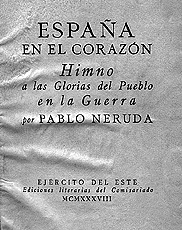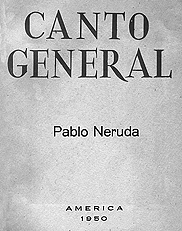 In 1920 he
writes a poem entitled "Hombre", which he signs with
the "pseudonym" of Pablo Neruda, the name which he will
continue to use for the rest of his life.
In 1920 he
writes a poem entitled "Hombre", which he signs with
the "pseudonym" of Pablo Neruda, the name which he will
continue to use for the rest of his life.
He travels to Santiago, the capital of Chile,
to study French at the Instituto Pedagógico of the Universidad de Chile.
In October 1921 he achieves his first literary
success obtaining the First Prize in the "Concurso de los
Juegos Florales", organized by the Federación de
Estudiantes, FECH, of the University, with the poem "La Canción de la
Fiesta"(The Feast Song),
published in the Students Federation's magazine
"Claridad". In 1927, he sets off to Rangoon, in Burma, to
work in a very modest consular position. In 1928, he is
transferred to Ceylon and later in 1930, to Java. The world
economic crisis forces him to return to Chile,where he arrives in
1932. During this traveling period throughout the Orient, he
writes one of his masterpieces, the first volume of
"Residencia en la Tierra". At the outbreak of the Spanish Civil War, while
Madrid is subjected to the bombing and the blockade of Franco's
troops, Neruda lives in Madrid. During that time, he writes
"España
en el Corazón", a unique book
because it was written on paper produced in rather peculiar
circumstances, during the Spanish Civil War. The book shown here
was made in an old monastery that served the purposes of an
improvised printing shop; due to the shortage of paper pulp, any
kind of material was good: enemies' flags or blood-stained shirts
of a Moorish soldier. In 1940, he travels to Mexico where he
fullfills consular duties until 1943. Back in Chile, in the year 1945, he is elected
Senator by the province of Tarapacá and Antofagasta. That same
year he is awarded the National Literature Prize. In 1949, he takes refuge in France and later in
Mexico, where he publishes the first edition of his most
extraordinary work, "Canto General". In Chile, at the same time, a clandestine
edition is published. From then on, Neruda travels and lives in many
different countries. That same year he donates his most valuable library and
collection of peri-winkles to the
University of Chile. On
the 30th of March, 1962, the Faculty of Philosophy and Education
of the University of Chile, in the University's Honor Hall,
receives Neruda as an academic member "in recognition of his
vast poetic work of universal meaning". The welcome speech
is made by Nicanor Parra.
 In 1923 he publishes his first book entitled " Crepusculario". At
the age of 20 years he is considered
one of the most promising young poets with his book "Veinte
poemas de amor y una canción desesperada".
In 1923 he publishes his first book entitled " Crepusculario". At
the age of 20 years he is considered
one of the most promising young poets with his book "Veinte
poemas de amor y una canción desesperada".  In
1934 he is appointed as Consul in Madrid, where he meets the most
reknown personalities of the so-called "Generación del
27", among them Alberti, Aleixandre, Altolaguirre, Gerardo
Diego, Miguel Hernández, García Lorca, and others.
In
1934 he is appointed as Consul in Madrid, where he meets the most
reknown personalities of the so-called "Generación del
27", among them Alberti, Aleixandre, Altolaguirre, Gerardo
Diego, Miguel Hernández, García Lorca, and others. As a
member of the Communist Party, in 1948 he is deprived of his
parliamentary rights and persecuted, whilst the Communist Party
outlawed.
As a
member of the Communist Party, in 1948 he is deprived of his
parliamentary rights and persecuted, whilst the Communist Party
outlawed.
 He returns to Chile and in 1954, on his 50th birthday,
he offers a series of conferences about his life and his poetry
at the University of Chile, that would be the basis for his
memoirs, which he publishes later, by chapters, in "O
Cruzeiro" magazine and then in the book "Confieso que
he vivido". During that same year he publishes his
"Odas Elementales" (Elementary Odes.
He returns to Chile and in 1954, on his 50th birthday,
he offers a series of conferences about his life and his poetry
at the University of Chile, that would be the basis for his
memoirs, which he publishes later, by chapters, in "O
Cruzeiro" magazine and then in the book "Confieso que
he vivido". During that same year he publishes his
"Odas Elementales" (Elementary Odes.
At the age of 60
, in 1964, Neruda writes another of his masterpieces, the five volumes of "Memorial de Isla Negra".